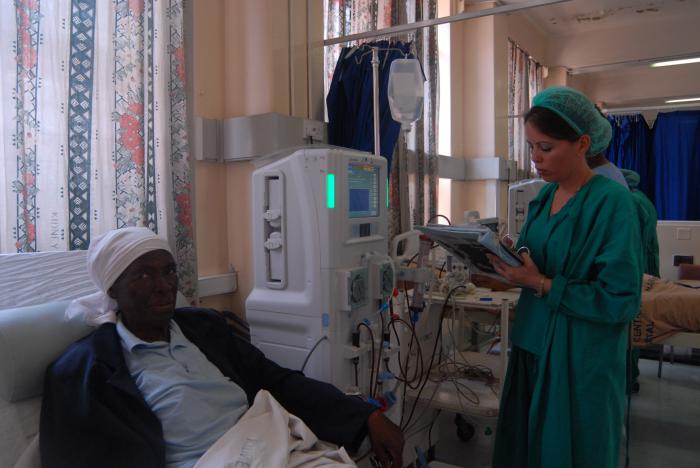
Harare, Zimbabwe.— They called it the hospital of the dispossessed, since the poor always sought help here, and continue to do so today. Thus, it is no accident that down its halls, among the humble, walk Cuban doctors.
Working in Harare’s Central Hospital, the largest of its kind in Zimbabwe, are seven Cuban healthcare professionals, who on a daily basis add pages to the story of Cuban solidarity, which reaches all corners of the world, and specifically this continent.
The team, composed of three doctors specializing in maxillofacial surgery, ophthalmology and dermatology, and four nurses, specially trained in the areas of nephrology, anesthesia and neonatology, are among the 45 Cuban collaborators currently working in this African country, where a total of 7,500 have offered their services since 1986.
The shortage of Zimbabwean specialists to meet specific healthcare needs in public hospitals is one of the principal challenges facing the nation, according to
Dr. Rolando Sánchez Martínez, head of the Cuban medical brigade. Covering this deficit, to the extent possible, is the role being undertaken by Cuban doctors, and the reason they are working in national and regional hospitals alongside Zimbabwean colleagues.
Dr. Sánchez recalled the warm welcome the brigade received, and their professional integration, which has obliged Cubans to learn the language, national dialects, and above all how to respect the culture and established medical protocols.
The Harare Central Hospital is a national reference center, and as a teaching institution bears important responsibility for the training of professionals.
Its clinical director, Dr. George Vera, spoke of the discipline, the work ethic, of Cuban collaborators, and did not hesitate to describe their performance as excellent. He thanked the Cuban government for its timely response to the country’s requests for support, and considers the presence of Cuban professionals very valuable to improving the quality of life of the Zimbabwean people.
NOTABLE CONTRASTS
In the hospital’s renal unit, where nurse Yaima Álvarez Acosta has worked for a year now, there are usually about eight patients, sometimes only three and as many as 15, the ward’s full capacity, in a city where kidney problems are common. Yaima reports that, on occasion, patients miss hemodialysis appointments, which as a nephrology specialist is difficult to assimilate. She is however absorbed in the routine and concentrates on those present, who receive the best of care.
Along with her Cuban colleague, Mayineisi Estrada, also a specialist nurse, Yaima has assumed the challenges she faces in Harare, despite never having worked in a hospital of this stature. Moreover, the doctor is not always on hand when emergencies arise, and she has been obliged to make difficult decisions, and perform procedures in accordance with the institution’s protocols, which may be new to her.
Yaima recounted how, just recently, at the very end of the workday, a patient developed serious complications, and she was the one her Zimbabwean colleagues sought for support, clearly illustrating the confidence Cuban healthcare workers inspire. Something, she says, that helps her overcome the distance from home, from her family and precious daughter, Samanta, who is her “reason for living.”
When it comes to beating homesickness, maxillofacial surgeon Pedro Pablo has a good recommendation, “Do your work well, and help Zimbabwean patients as much as you can.”
When the doctor from the province of Granma arrived in Harare, there was only one plastic surgeon in the country, and much work to be done. A year later, they have alleviated the situation, he said, adding, however, that he sees many advanced tumors, a serious professional challenge, but at the same time an enriching experience, he added
There are many stories about Cubans at the Harare hospital, often told by Zimbabweans themselves. Muchaneta Gudza-Mugabe, head of the bacteriology department, was among a group of students from the country who, back in 1993, studied to become a professional on Cuba’s Isle of Youth.
She received here B.S. in Biology in Cuba and earned a masters degree in her own country. Despite the many years which have gone by, she affectionately recalls the Cuban hospitality she received, her caring professors, and the camaraderie among students - not to mention the beans with rice, and dancing a bit of salsa, she enjoyed.
Cuban collaborators will soon be taking well-deserved vacations in Cuba, and
Muchaneta already knows what “souvenir” she’ll request: a few black beans to plant, as she has done before. Thus many stories intersect in Harare, whenever our small island’s solidarity, both at home and abroad, plays the leading role.








